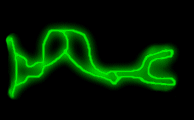The Middle Ear

The Ossicles
The ossicles are three tiny bones (the smallest in the human body) called the malleus, incus, and stapes, or alternately the hammer, anvil, and stirrup due to their shapes. These bones transfer the vibrations of the eardrum to the inner ear.
Malleus (Hammer):
|
Eustachian Tube:
|
The eustachian tube serves two purposes: it lets fluid drain down the throat, and it equalizes pressure on either side of the ear drum. The tube is about 3.6 cm long, made up of cartilage and bone, and lined with cilia, or very tiny hairs. It is connected to the cavity of the middle ear, and at the bottom opens into the nasopharynx (located in the back of the mouth). If excess fluid builds up in the middle ear, it drains down the eustachian tube into the throat. In order to equalize the pressure in the middle ear with the pressure of the outside air, the eustachian tube opens to allow air to flow in or out of the tube about every three times we swallow, chew, or yawn.
|

